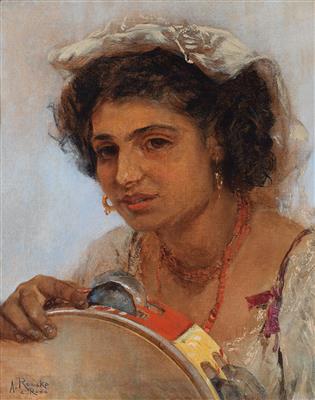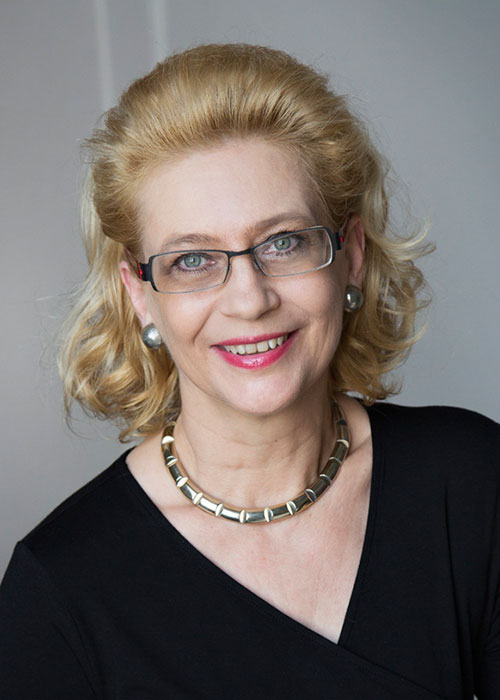Anton Romako

(Atzgersdorf 1832–1889 Vienna)
Italian Girl with Headscarf and Tambourine, signed, inscribed A. Romako a Roma, oil on canvas, 43.3 x 35.3 cm, framed, (Rei)
Catalogued and illustrated in:
Cornelia Reiter, Anton Romako 1832–1889, Pionier und Außenseiter der Malerei des 19. Jahrhunderts, monograph and catalogue raisonné, published by Bibliothek der Provinz, Belvedere Vienna 2010, p. 63, no. 257
Picturesquely dressed girls from the Campagna are a common motif amongst the oeuvre of Anton Romako who was controversial in his own lifetime, and was probably painted during the time he spent in Italy. Growing up in difficult family circumstances in Vienna, in 1847 he began studying at the Vienna Academy before moving on to Munich where he was taught by Wilhelm Kaulbach and the historical painter Carl Rahl. After quarreling with his teacher, he moved to Italy, first to Venice and then to Rome in 1857. Initially very popular, the artist began to unsettle his public with his unrealistic colouring and by merging contrasting areas of the painting. He died in Vienna in 1889, both financially and privately a broken man.
Esperta: Mag. Dimitra Reimüller
 Mag. Dimitra Reimüller
Mag. Dimitra Reimüller
+43-1-515 60-355
19c.paintings@dorotheum.at
21.04.2016 - 18:00
- Stima:
-
EUR 20.000,- a EUR 25.000,-
Anton Romako
(Atzgersdorf 1832–1889 Vienna)
Italian Girl with Headscarf and Tambourine, signed, inscribed A. Romako a Roma, oil on canvas, 43.3 x 35.3 cm, framed, (Rei)
Catalogued and illustrated in:
Cornelia Reiter, Anton Romako 1832–1889, Pionier und Außenseiter der Malerei des 19. Jahrhunderts, monograph and catalogue raisonné, published by Bibliothek der Provinz, Belvedere Vienna 2010, p. 63, no. 257
Picturesquely dressed girls from the Campagna are a common motif amongst the oeuvre of Anton Romako who was controversial in his own lifetime, and was probably painted during the time he spent in Italy. Growing up in difficult family circumstances in Vienna, in 1847 he began studying at the Vienna Academy before moving on to Munich where he was taught by Wilhelm Kaulbach and the historical painter Carl Rahl. After quarreling with his teacher, he moved to Italy, first to Venice and then to Rome in 1857. Initially very popular, the artist began to unsettle his public with his unrealistic colouring and by merging contrasting areas of the painting. He died in Vienna in 1889, both financially and privately a broken man.
Esperta: Mag. Dimitra Reimüller
 Mag. Dimitra Reimüller
Mag. Dimitra Reimüller
+43-1-515 60-355
19c.paintings@dorotheum.at
|
Hotline dell'acquirente
lun-ven: 10.00 - 17.00
kundendienst@dorotheum.at +43 1 515 60 200 |
| Asta: | Dipinti dell’Ottocento |
| Tipo d'asta: | Asta in sala |
| Data: | 21.04.2016 - 18:00 |
| Luogo dell'asta: | Wien | Palais Dorotheum |
| Esposizione: | 09.04. - 21.04.2016 |
